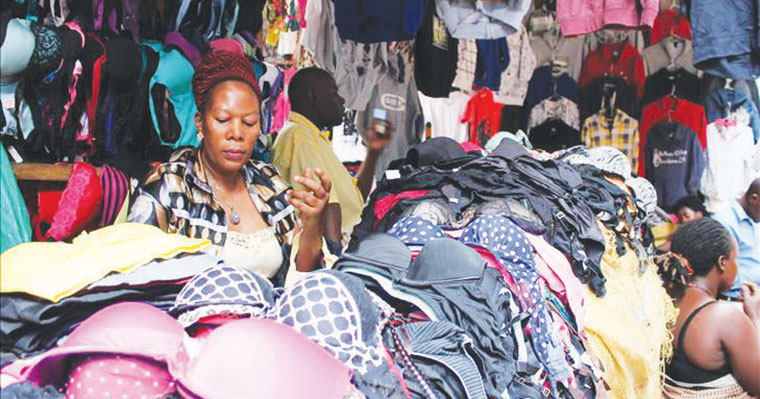
In the bustling caverns of St. Balikuddembe market, commonly known as Owino, the true anatomy of Uganda’s second-hand clothing trade is laid bare.
Here, the fate of every imported bale, or endibota, is decided not by policymakers in air-conditioned offices, but by the skilled hands of sorters who transform bulk imports into a complex, multi-tiered economy.
At the bottom of this value chain lies ‘fagi’, the torn, stained and outdated items that, despite being the least desirable, form a critical, often overlooked pillar of affordability and recycling in a nation where 16.9 per cent live below the poverty line.
A recent study by Gateway Research Centre delves into this intricate ecosystem, revealing a sophisticated grading and sorting process that begins the moment a bale is cracked open. Imported bales, weighing between 45kg and 100kg, are pre-graded abroad into three main categories: First Class (Cream), Second Class, and Third Class. However, the final and most crucial classification happens right here in Ugandan markets.
“When I opened the bale, most of it was fagi; I made losses this time,” a clothes trader in Owino lamented to researchers, capturing the high-stakes gamble inherent in each purchase.
The study found that a single bale can yield a spectrum of outcomes. A bale of second-hand jeans, for instance, might contain 30 per cent first-class (branded, clean), 50 per cent second-class (usable but faded), and 20 per cent third-class, the fagi. But the process doesn’t end there. Once opened, items are further sub-categorized.
The very bottom of the pyramid splits into rags and outright waste, creating a secondary recycling economy.
“We try to use everything. Even the rags have a market with mechanics and cleaning companies,” explained Maama Joan, a vendor in Jinja market. Another trader in Masaka confirmed, “Sometimes you open a bale and end up with a lot of fagi-things even the poorest won’t buy. We cut them up for rags or sell them to garages.”
This ‘Fagi economy’ is a vital cop- ing mechanism for both traders and consumers. For low-income buyers, it offers clothing for as little as Shs 500 (approximately US$ 0.13). For traders, it represents a way to mitigate total loss on a bad bale.
The goods are often purchased by intermediaries locally known as abalanguzi, who specialize in selling the lowest-grade goods in village markets. However, this intricate system is under immense strain from a blunt and punitive tax regime.
The Uganda Revenue Authority’s (URA) uniform per-kilogram tax model fails to distinguish between a bale of high-value grade A items and one filled with unsellable fagi. Traders are charged the same rate, $0.89/kg for clothes, regardless of the actual market value of the contents, a policy they find deeply unjust.
“URA does not care what is inside the bale. Whether it’s full of small, unsellable bags or torn clothes, you pay the same high tax,” explained Naigaga, a bag seller in Jinja. “But when you open it, you find goods that can’t even fetch Shs 5,000 in the market.”
This heavy taxation erodes the already narrow profit margins on viable items and turns fagi from a manageable loss into a significant financial liability. To support this complex and economically vital ecosystem, rather than weaken it, targeted policy reforms are urgently needed.
IMPLEMENT DIFFERENTIATED TAX CODES BASED ON BALE GRADE
The most critical reform is for URA to abandon its one-size-fits-all approach. The ministry of Finance, in consultation with traders, should create distinct tariff codes for pre-graded bales.
A bale declared and verified as Third Class or fagi should be taxed at a minimal symbolic rate, while higher rates apply to First and Second Class. This would introduce basic fairness, prevent traders from being bankrupted by taxes on worthless items, and formally recognize the reality of the market’s structure.
FORMALIZE AND SUPPORT THE RECYCLING VALUE CHAIN
Parliament, through a comprehensive SHGs trade policy, should promote eco-friendly disposal and upcycling initiatives for unsellable textiles.
This could involve partnering with the private sector or NGOs to establish collection centers for textile waste in major markets, transforming an environmental challenge into a green entrepreneurship opportunity.
This would add value to the very bottom of the fagi chain and mitigate the waste problem highlighted in the report.
INTEGRATE INFORMAL SORTERS AND ‘ABALANGUZI’ INTO THE FORMAL ECONOMY
Kampala Capital City Authority (KCCA) and municipal authorities should work with market associations to create recognized and regulated spaces for traders dealing in lower-grade items.
By bringing these actors into the formal fold, they can access better trading conditions and be included in sensitization programs. This acknowledges that the fagi trade is not an anomaly but an integral part of a multi-layered sector that serves diverse economic classes.
The sorting sheds of Owino are more than just a distribution point for used clothing; they are the engine of an inevitable economy that serves millions. A smart regulatory approach would not seek to eliminate fagi, but would instead recognize its role and build policies that allow the entire ecosystem, from cream to rags, to thrive sustainably and equitably.
The authors are researchers at Gateway Research Center, Kampala, Uganda.



